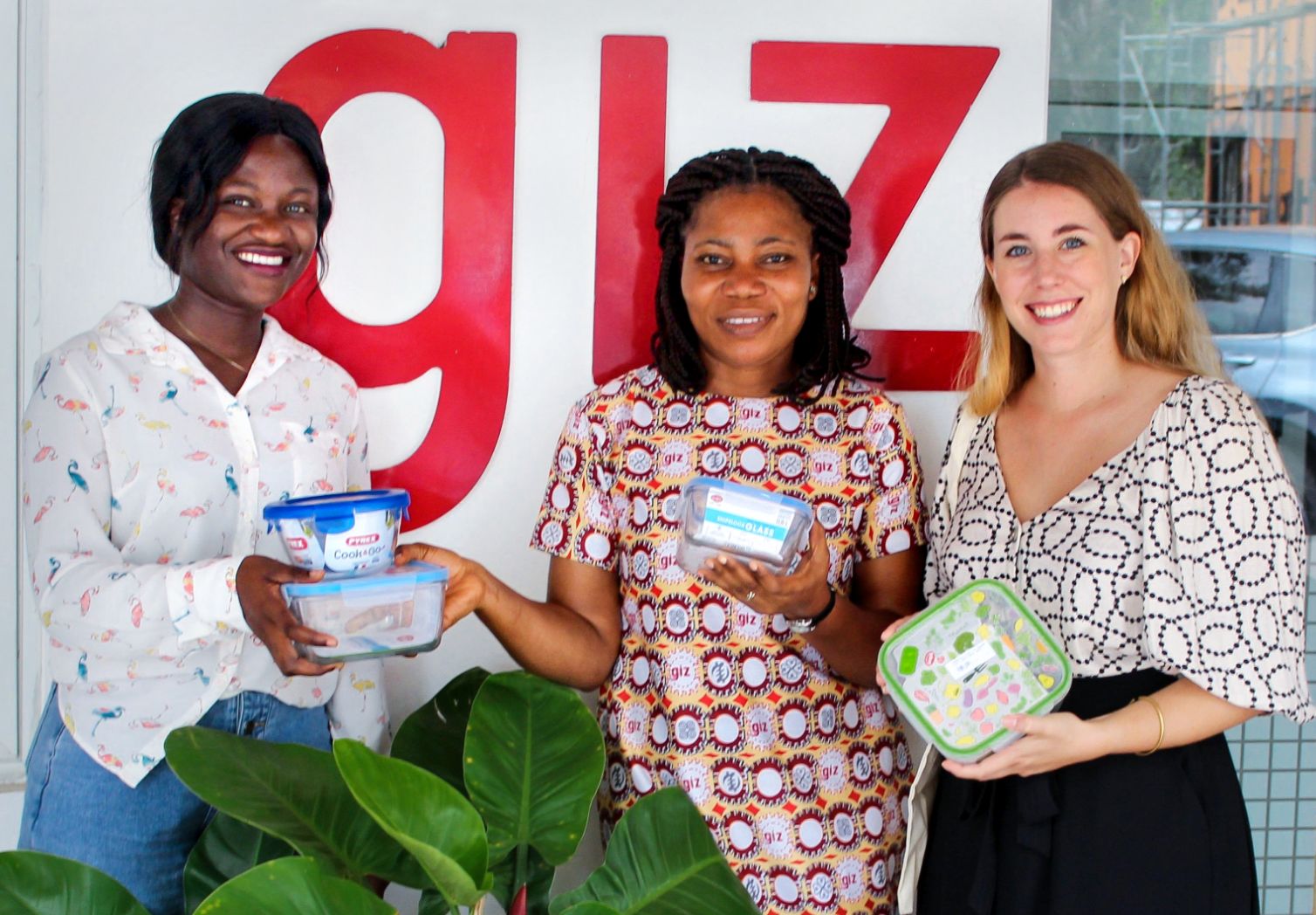Just imagine looking out of a 10th-storey window and seeing, at eye level, the top sheet of a neatly sorted and stacked tower of copy paper. The stack would be a good 30 metres high. A gust of wind would scatter 306,000 sheets of paper. GIZ saves this quantity of paper every year just by documenting staff assessment and development talks and manager dialogues digitally, rather than on paper.
Conserving naturalresources andavoiding waste
GIZ is reducing paper consumption and has declared war on single-use plastics.

Although we cannot dispense entirely with paper in everyday office work, we strive to consistently reduce our consumption, thus conserving natural resources. One way we do so is by becoming increasingly digital. Since October 2021, all documents destined for internal use have been maintained electronically only, with very few exceptions where we are required by law to keep paper records. The records of staff assessment and development talks are just one example. In procurement, we have introduced an electronic award file and the events we stage are increasingly paper-free.
In 2022, GIZ reduced its paper consumption in Germany by a massive 60 per cent compared to 2019, from 11.9 million sheets of paper to 4.7 million. Outside Germany, paper consumption fell by almost 30 per cent over the same period – from 73.6 million sheets to 52.3 million. In Germany, we use only eco-friendly paper certified under the Blue Angel scheme. It is not always possible to procure this paper in our countries of assignment. But we have managed to switch to eco-friendly paper only in ten countries in Africa, Asia and Europe, thus raising the percentage of recycled paper used outside Germany in 2022 by seven per cent as compared to 2019.
Management system in Germany
In Germany, GIZ complies with the Eco-Management and Audit Scheme (EMAS), which is an extension of the ISO 14001 environmental management standard. EMAS is the world’s most exacting certification system for corporate environmental management. The scheme’s members are required to make continuous, annually verified improvements in their environmental performance. The overriding priority is to steadily reduce GIZ’s environmental impacts and provide evidence of this reduction. GIZ produces an environmental audit every year setting out evidence of progress made towards our environmental goals.
Management system outside Germany
We use the Corporate Sustainability Handprint® (CSH) to record our progress in the field of sustainability in the countries in which we operate. It provides GIZ staff with a uniform framework for corporate sustainability and therefore also for environmental management. Since 2018, we have collected climate and environmental data every year in our countries of assignment and country offices. Although the quality and availability of data are still not comparable to Germany, the situation is improving steadily.
Driving forward recycling and raising staff awareness
Saving paper not only conserves natural resources in manufacturing; it also reduces the waste generated by GIZ. Another of our stated aims, which we have set out in our Sustainability Programme, is to generate as little waste as possible and achieve a high rate of reuse and recycling. To achieve the latter, GIZ Kenya has, for instance, introduced a waste management strategy under which electronic waste is picked up by a local NGO and recycled.
To prevent waste, our procurement officers ensure that as little packaging waste as possible is generated. To this end, we have agreed on sustainability criteria for the office supplies we use. Environmentally sound products are listed first in our online product lists, thus helping to ensure they are ordered rather than less sustainable products.
Plastic bags, plastic cutlery, plastic cups – if you buy your lunch to take away in Ghana, your meal will almost always be served with a lot of single-use plastic. The staff of GIZ Ghana wanted to do something about this. But what? They came up with a simple solution: GIZ Ghana bought a total of 120 reusable glass containers and 32 fabric bags in 2022. Staff members can now use these to pick up their lunches. On top of this, GIZ Ghana launched a four plastic-free months campaign, from September to December 2022. The aim was for staff to not use any single-use plastic during this period, and in most cases they succeeded. A ‘plastics patrol’ monitored the office building to ensure compliance, and raised their colleagues’ awareness regarding the need to prevent waste. The reusable glass containers have been well received. More and more colleagues now use them.
Below you will find information about the Global Reporting Initiative’s (GRI) sustainability standards:
Material topic 2: Protection of natural resources
| GRI | UNGC | SDG | DNK | |||||||||||||||||||||||||||||||||||||||||||||||
|---|---|---|---|---|---|---|---|---|---|---|---|---|---|---|---|---|---|---|---|---|---|---|---|---|---|---|---|---|---|---|---|---|---|---|---|---|---|---|---|---|---|---|---|---|---|---|---|---|---|---|
| 3-3 | Management approach |
Foundation
|
||||||||||||||||||||||||||||||||||||||||||||||||
| 301-1 | Materials used by weight or volume |
|
7, 8 | 6, 8, 12 | 11, 12 | |||||||||||||||||||||||||||||||||||||||||||||
| GRI | UNGC | SDG | DNK | |||||||||||||||||||||||||||||
|---|---|---|---|---|---|---|---|---|---|---|---|---|---|---|---|---|---|---|---|---|---|---|---|---|---|---|---|---|---|---|---|---|
| 3-3 | Management approach |
Foundation
|
8, 9 | 11, 13 | 13 | |||||||||||||||||||||||||||
| 303-5 | Water consumption |
|
7–9 | 6, 8, 12 | 11, 12 | |||||||||||||||||||||||||||
| GRI | UNGC | SDG | DNK | |||||||||||||||||||||||||||||||||||||||||||||||||||||||||||
|---|---|---|---|---|---|---|---|---|---|---|---|---|---|---|---|---|---|---|---|---|---|---|---|---|---|---|---|---|---|---|---|---|---|---|---|---|---|---|---|---|---|---|---|---|---|---|---|---|---|---|---|---|---|---|---|---|---|---|---|---|---|---|
| 103-1 103-2 103-3 |
Management approach |
Foundation
|
7–9 | 6, 8, 12 | 12 | |||||||||||||||||||||||||||||||||||||||||||||||||||||||||
| 306-3 | Waste generated |
|
7–9 | 6, 8, 12 | 12 | |||||||||||||||||||||||||||||||||||||||||||||||||||||||||